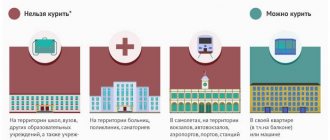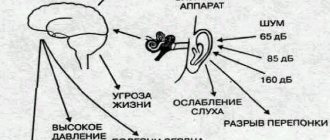One of the main activities of the state is to ensure the sanitary and epidemiological well-being of the population in Russia.
Sanitary well-being and protection of the health of citizens are proclaimed in Article 41 of the fundamental law of Russia - the Constitution.
- When criminal liability arises under Art. 236 of the Criminal Code of the Russian Federation?
What law provides for liability?
Responsibility for sanitary offenses is provided for in various legislative and by-laws of the Russian Federation, departmental guidance documents, for example, such as: decrees of the Government of the Russian Federation, the Criminal Code of Russia (Criminal Code of the Russian Federation), the Code of Administrative Offenses (CAO), sanitary rules and regulations (SanPiN ), regional laws of the constituent entities of the Russian Federation, and so on.
The fundamental document in this area is Federal Law No. 52 Federal Law of September 30, 1999 “On the sanitary and epidemiological welfare of the population.” This regulatory act considers all aspects of activity in the area we have designated and, among other things, determines the types and degree of responsibility for non-compliance with sanitary legislation.
The Chamber of Commerce and Industry will not issue a certificate of force majeure to everyone
The Chamber of Commerce and Industry (CCI) said it will strictly vet all applicants for a force majeure certificate. Let us remind you that the presence of such a certificate exempts you from civil liability for breach of contract. The applicant will need to prove that it was the decrees of the President of the Russian Federation No. 206 and 239 that prevented his activities, and not something else. Therefore, regional Chambers of Commerce and Industry will request the following documents:
- confirmation that the applicant is not included in the list of organizations that are allowed to operate by presidential decrees. We are talking about medical companies, continuously operating organizations, etc.;
- a document confirming that the regional authorities have limited the candidate’s work;
- local regulations of the enterprise that establish the operating mode during the period of validity of decrees No. 206 and 239;
- production plans, work schedules and other similar documents.
Organizations that do not provide evidence will not be able to obtain a certificate and refer to the coronavirus as force majeure. At the same time, the Chamber of Commerce and Industry reminded that the loss of money from the transfer of workers to remote work or a decrease in orders are not in themselves circumstances of force majeure.
What violations of sanitary norms and rules are punishable?
The list of violations of sanitary rules is established by Federal Law No. 52 and is very extensive. In particular, protected norms that are subject to certain control by the state include rules and requirements in various areas of human life:
- Chemical, biological and certain types of products potentially hazardous to humans.
- Food products, additives, raw materials for such products, items and technologies in the field of their production.
- Any products that are imported into the territory of the Russian Federation.
- Organization of catering for the population.
- Sanitary and epidemiological requirements for water bodies.
- Drinking water supply and maintenance of water supply facilities.
- Atmospheric air in cities and other settlements, air in the territory of industrial enterprises, work areas of industrial and residential premises.
- Soils, maintenance of urban and rural settlements, industrial sites.
- Collection, accumulation, transportation, disposal, disposal and disposal of production and consumption waste.
- Living spaces.
- Operation of industrial and public premises, buildings, structures, equipment and transport.
- Conditions for working with biological substances, organisms and their toxins.
- Conditions for working with sources of physical factors affecting humans.
- Conditions for children's recreation and health, their upbringing and education.
Fundamental areas and requirements are listed; more detailed requirements and measures to comply with them are enshrined in departmental regulations of the bodies exercising control over sanitary and epidemiological requirements in the Russian Federation (in particular, sanitary rules and regulations, SanPiN).
Types of liability for violation of sanitary and epidemiological rules
| Type of responsibility | Description |
| Disciplinary | Persons performing their duties under an employment contract with an employer are subject to this. Responsibility is fixed in job descriptions. Violations are identified during administrative and production control by management. |
| Administrative | All categories of subjects are subject to this: citizens, individual entrepreneurs, legal entities and officials. Responsibility is established by the Code of Administrative Offenses of the Russian Federation. Identified by officials of regulatory authorities. |
| Criminal | All of the above subjects are subject to. Liability is established by the Criminal Code of the Russian Federation. Identified by officials of regulatory authorities and citizens. |
| Civil law | Established by Article 57 of Federal Law No. 52 for harm caused to a person or property due to violation of sanitary legislation. Damage may be compensated in the appropriate manner. |
If they come, will they check everything?
No, no, all your secrets will not be revealed. You are letting officials into the premises who must act according to the law. Any checks have limitations, and they are spelled out in Art. 15 294-FZ.
Inspectors must not:
- Exceed authority. Rospotrebnadzor does not check labor relations and tax payments. They will ask about medical books, but not about wages below the minimum wage.
— Go beyond the scope of the test. The order states that the condition of the premises and production processes are being checked, which means there will be no talk of refunds to consumers.
— Violate inspection deadlines. Maximum - 20 days according to clause 1 of Article 13 294-FZ (this is not necessary for checking a small business).
— Pick up original documents and computers. During administrative inspections, this is only possible if inspectors come with the police - Art. 13 and paragraph 1. Art. 15 144-FZ “On operational investigative activities.”
During the inspection, make sure that inspectors do not break the law. If possible, record the process on a video camera: anything can happen; suddenly they will look for evidence of violations in your personal belongings. If they ask for a bribe, you can contact the Department of Economic Security and Anti-Corruption or the Prosecutor's Office.
Administrative liability for sanitary offenses
This is the most common type of liability used in practice.
Enshrined in Chapter 6 of the Code of Administrative Offenses of the Russian Federation - in the field of health and sanitary-epidemiological welfare of the population and includes the following articles: 6.3, 6.4-6.7, 6.35 for such types of violations as:
- 3 – rules in the field of ensuring the sanitary and epidemiological well-being of the population;
- 4 – operation of residential and other premises and transport;
- 5 – requirements for drinking water;
- 6 – catering in special places (canteens, cafes, etc.);
- 7 – conditions for children’s recreation and health, their education and upbringing;
- 35 – management of production and consumption waste.
There are also several specialized compounds that also relate to the topic under consideration:
- 24 – smoking tobacco;
- 26 – smoking in the area covered by the prohibition sign;
- 5 – concealment of information about the quality of air, water and radiation status;
- 42 – violation of the regime of the water protection zone (for example, parking of a vehicle in the water protection zone), activity on the territory of the sanitary zone of drinking water supply sources.
The main article in the chapter discussed, which relates specifically to sanitary and epidemiological rules, is 6.3 of the Administrative Code.
What is the threat under the Code of Administrative Offenses of the Russian Federation?
For violation of the law in the area we are considering, there is not such a wide range of sanctions. The following types of punishment are expected to be imposed:
- Warning;
- Administrative penalty;
- Suspension of the activities of an individual entrepreneur or legal entity.
The amount of fines varies depending on the status of the entity brought to administrative responsibility, from 100 rubles when attracting a citizen, and up to 1 million rubles when attracting an organization in the form of a legal entity under various articles of the Code of Administrative Offenses, discussed above.
When assigning punishment, officials who decide to prosecute take into account various points and factors, such as:
- public danger of an offense (unmown grass near the fence of a private house or pollution of a reservoir with wastewater from an enterprise);
- subject of attraction (officials and legal entities are punished much more severely);
- consequences resulting from the offense (minor poisoning of a citizen in a restaurant or mass poisoning of citizens of a populated area as a result of an enterprise discharging chemical waste into a water intake);
- repetition of the offense (often a warning is issued to the subject for committing offenses for the first time).
What is the procedure for imposing a fine for non-compliance?
If it is revealed that an offense has been committed that provides for liability for violations of sanitary standards, an authorized official draws up a protocol on the administrative offense and initiates an administrative case .
All circumstances of the violation are recorded (an inspection of the scene of the incident is carried out), if necessary, explanations are taken from the victims, the offender, and persons who may be witnesses.
Documents are confiscated . A person who has committed an offense may be suspended from work, brought to the body exercising supervision and control to draw up a protocol, and the activities of the facility may be suspended.
After all necessary measures have been taken, the material of the administrative case is sent for consideration to the person authorized by Article 23 of the Code of Administrative Offenses of the Russian Federation.
Having considered the administrative material, the official makes a decision to impose an administrative penalty . In our case, in the form of a fine.
For the offenses we are considering, the decision to impose a fine is made in accordance with Article 23.13, mainly by the bodies of Rospotrebnadzor (sometimes, for example, under Article 6.24 - smoking, the decision can be made by police officers).
How much time is given to pay the fine?
The most well-known and common indication today is a fine. This is what the specialists of the above body resort to if the violation does not have too serious consequences. All detailed information about the amount of the fine to be paid and the period during which the guilty person is obliged to pay it must be present in the issued order.
Important! According to the Code of Administrative Offenses of the Russian Federation, the fine must be paid by the guilty person within sixty days from the date the resolution enters into legal force. In some situations, deferred payment is provided.
If the money for the fine is not received, then the guilty person may also be held accountable, and the amount of the fine will be doubled. When the violator is unable to pay the required amount, he may be sentenced to perform compulsory labor or be arrested for 15 days.
Criminal liability for violation of sanitary legislation
Violation of sanitary and epidemiological rules also provides for criminal liability.
When criminal liability arises under Art. 236 of the Criminal Code of the Russian Federation?
Article 236 of the Criminal Code of the Russian Federation provides grounds for prosecution. They are violations of sanitary rules (all the same violations for which administrative liability is provided), resulting in mass disease or poisoning of people. In the case of a qualified sign in part two, the death of a person must occur.
The consequences in the main and qualified composition must be caused by the act of the subject with a careless form of guilt.
A mandatory feature of the composition must be the presence of a causal connection between the offender’s act and the consequences (for example, death precisely from poisoning with poor-quality food).
The most striking examples of cases where real criminal cases are initiated are cases of mass poisoning in public catering establishments.
Example 1. So, after poisoning during the celebration of the anniversary of citizen V. in one of the restaurants in the Vladimir region, a criminal case was opened under Part 1 of Article 236 of the Criminal Code. According to the results of medical research, it was established that the cause of the mass poisoning of 40 people was their infection with an infectious disease - salmonellosis.
The presence of the causative agent of this disease in the restaurant was a simple disregard for the sanitary rules established by SanPiN for public catering organizations.
If any of the affected citizens had died as a result of the disease, a criminal case would have been initiated under Part 2 of Article 236 of the Criminal Code.
Example 2. The head of one of the enterprises producing chemical products allowed the discharge of untreated industrial water into a reservoir where one of the city water intake stations was located. As a result, more than 50 people were hospitalized in the city hospital with acute poisoning from the chemical substance – chlorine. Two people died from poisoning on the second day of resuscitation.
The director of the enterprise and the person responsible for the purification of industrial waters were prosecuted under Part 2 of Article 236 of the Criminal Code of the Russian Federation and received real prison sentences.
Intentional poisoning of a person
It is necessary to distinguish between liability for failure to comply with sanitary standards and intentional actions to cause harm to health or death as a result of, for example, food poisoning or chemicals under the guise of taking medications.
Such cases, although rare, do occur in judicial practice.
All intentional actions aimed at causing death, even if disguised as household poisoning, will be regarded by law enforcement agencies as attempted murder and qualified under Article 105 of the Criminal Code of the Russian Federation.
Coronavirus infection
There is no such wording as infection with a coronavirus or a virus called COVID-19 in the current Russian legislation.
Responsibility for contracting this viral infection will most likely be considered within the framework of existing laws and articles of the Criminal Code and the Code of Administrative Offenses.
01/31/2020 By Decree of the Government of the Russian Federation No. 66, coronavirus infection (2019-nCoV) was added to the List of diseases that pose a danger to others (GD dated 12/01/2004 No. 715).
We have provided more detailed information on this topic in another article.
What are the responsibilities?
| Sanctions | Part 1 Article 236 | Part 2 Article 236 |
| Fine | up to 80,000 rubles | — |
| Deprivation of the right to hold office | up to 3 years | — |
| Mandatory work | up to 360 hours | up to 480 hours |
| Correction work | up to 1 year | from 6 months to 2 years |
| Restriction of freedom | ||
| Forced labor | — | up to 5 years |
| Deprivation of liberty | — |
The table lists all currently applicable types of punishment. As you can understand, punishment in the event of grave consequences in the form of death also includes deprivation of the subject’s freedom.
The procedure for bringing to responsibility for sanitary violations
In accordance with Article 151 of the Criminal Procedure Code of the Russian Federation, Article 236 of the Criminal Code is under the jurisdiction of the internal affairs bodies - the police. The investigation of the criminal case will be carried out by the Department of Internal Affairs investigation.
Information about the presence of signs of a crime under Article 236 of the Criminal Code comes to the police department from various sources:
- Medical institutions (in cases of mass poisoning or death of citizens).
- Bodies of Rospotrebnadzor (received during their scheduled inspections or inspections carried out in response to complaints).
- Statements, complaints and appeals from citizens.
- Appeals from municipal services and authorities (usually redirected appeals from residents).
- Prosecutor's office (when conducting inspections as part of general supervision of legislation).
- MASS MEDIA.
Before initiating a criminal case, a preliminary check is carried out in order to identify the signs of the composition of the criminal code in question. All necessary actions are carried out, including sanitary and epidemiological examination (if necessary). The investigated criminal case is sent to the court for consideration and decision.
During the investigation, the injured party may also file a claim for compensation for property and moral damage.
Will they come to check on me?
The accounting media is scary, but we’ll be honest: the probability is low, especially if you are not involved in catering or medicine and do not sell labeled goods. Let's figure out why.
Small businesses are not inspected according to plan
Inspections every three years are not about you. In 2021, regulatory authorities abandoned scheduled visits to small and medium-sized businesses - and the exemption is valid until the end of 2021 - see paragraph 7 of Government Decree No. 1969. The practice of re-registering companies to avoid inspections is a thing of the past. Only large businesses should worry, and this is a different weight category, where there are more than 250 employees and annual income is more than 2 billion per year (according to Government Decree No. 265 of April 4, 2016).
Exceptions:
— Licensed types of activities. For example, military, medicine, private security and fire fighting, encryption.
— Companies with a high hazard class.
— Companies that were already inspected less than 3 years ago and found violations.
They don’t check unscheduled without a good reason
An unscheduled inspection requires a reason - for example, a customer complaint. Not every complaint will do. Let’s say a competitor writes to Rospotrebnadzor: “I am anonymous Vasya, I was deceived in the store!!!” Such a letter will have no consequences: it is anonymous, without evidence of violation and without an attempt to talk to the seller.
It is impossible to check everyone
Rospotrebnadzor does not have unlimited resources. Any inspection is a big deal both in terms of organization and in terms of bureaucracy. In order not to waste time and bring maximum benefit to people, the most dangerous cases are chosen. The danger depends on the number of consumers, the degree of possible harm to health and the environment and the number of previous violations. The first three out of six danger classes received 2% of the business, and it is almost always medium and large.
Small businesses are approached on a residual basis. More often they are limited to checking documents according to the rules of Art. 11 294-FZ. They ask for declarations of conformity, medical books and vaccination certificates, contracts for disinfection and garbage removal. The deadline for submitting documents to the local office of Rospotrebnadzor is 10 days. If inspectors find a violation, the entrepreneur is given another 10 days to explain.
It is impossible to give a 100% guarantee that there will be no on-site inspection. They come suddenly with an unscheduled inspection: they report it 24 hours in advance, and if there is a threat to people’s health, they come without warning at all. To avoid confusion when meeting with inspectors, read the following sections.







